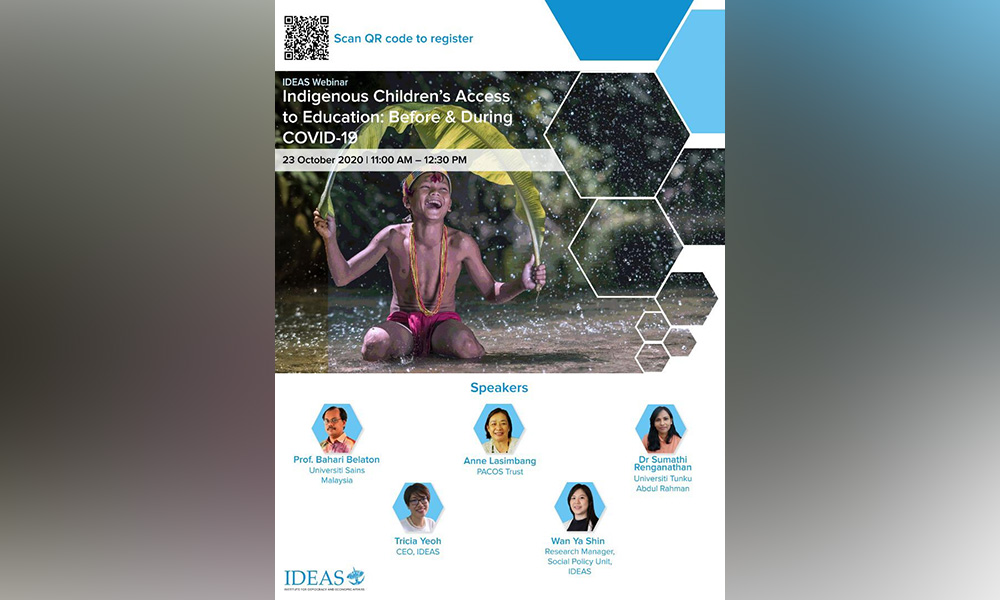The Institute for Democracy and Economic Affairs (Ideas) will be hosting a public webinar tomorrow at 11am on the subject of Indigenous Children's Access to Education: Before & During Covid-19.
The webinar will feature such speakers as Universiti Sains Malaysia’s School of Computer Sciences dean Prof Bahari Belaton, Ideas' social policy research manager Wan Ya Shin, Anne Lasimbang of the Pacos Trust, and UTAR's Sumathi Rengnathan from the Department of Languages and Linguistics.
Ideas today published a policy paper drafted by Wan titled “Education Policies in Overcoming Barriers Faced by Orang Asli Children: Education for all”.
The paper is a baseline study based on previous studies and is to be used to conduct further primary research, which was planned for this year but delayed due to Covid-19 and the ensuing movement control order (MCO).
The paper reviews several policies and programmes and finds that the outcomes of government programmes have not been commensurate with the effort and resources poured into developing and implementing them.
While there appears to be some reduction in the gap between Orang Asli students and the national average according to the Malaysian Education Blueprint (2013-2025), key challenges such as lack of opportunities to attend preschool and contextualised curriculum and pedagogy have not been adequately addressed.
Despite success stories, these significant challenges have resulted in persistently higher school dropout rates by Orang Asli children compared to the national average.
Last month, Malaysiakini published a report in which Ita Bah Nan, a coordinator and teacher at Sekolah Deek Penaney, a school near Bidor, Perak highlighted the common problems that people who lived in the interiors faced: electricity supply, internet access, and device ownership.
"After MCO, the update from schools and teachers is that the attendance of students in primary and secondary schools has fallen due to the declining interest of students and the need for masks because there are parents who cannot afford to supply disposable masks.
"There are supposed to be free masks elsewhere, I suppose, but here one box of face masks costs RM16 to RM19. Many parents can't afford to buy a face mask, so they don't send the kids to school," she told Malaysiakini.
Wan said she hoped the observations and recommendations in the paper will contribute to the improvement of policies and programmes to benefit Orang Asli children.
"This is not just an issue faced by Orang Asli communities but a national education issue, and we need to ensure that all Malaysian children have access to quality education," she added.
Among the recommendations based on the findings of the research are:
- Policies should identify and tackle underlying challenges instead of addressing ‘symptoms’
- Periodic evaluation and impact analysis of policies and programmes are needed to ensure effectivity and address new issues and gaps that arise during implementation
- Look into needs of Orang Asli children who have never been to school and identify and address their challenges
- Respect the voice of Orang Asli communities and their right to self-determination when formulating policies and programmes
- Contextualise the curriculum and incorporate indigenous values and culture so that it is relevant to the students’ lives
- Provide adequate training to teachers and support them with professional development programmes
- Re-examine the focus of the Malaysian education system and move towards holistic education - Mkini





No comments:
Post a Comment
Note: Only a member of this blog may post a comment.